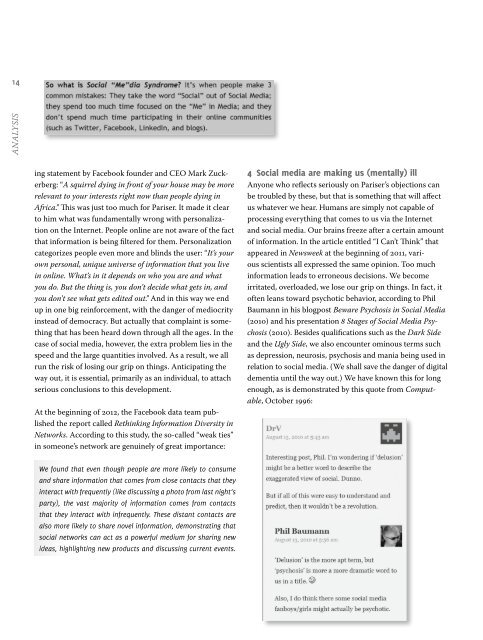VINT-The-Dark-Side-of-Social-Media-Alarm-Bells-Analysis-and-the-Way-Out
VINT-The-Dark-Side-of-Social-Media-Alarm-Bells-Analysis-and-the-Way-Out
VINT-The-Dark-Side-of-Social-Media-Alarm-Bells-Analysis-and-the-Way-Out
Create successful ePaper yourself
Turn your PDF publications into a flip-book with our unique Google optimized e-Paper software.
14<br />
aNalYSiS<br />
ing statement by Facebook founder <strong>and</strong> CEO Mark Zuckerberg:<br />
“A squirrel dying in front <strong>of</strong> your house may be more<br />
relevant to your interests right now than people dying in<br />
Africa.” This was just too much for Pariser. It made it clear<br />
to him what was fundamentally wrong with personalization<br />
on <strong>the</strong> Internet. People online are not aware <strong>of</strong> <strong>the</strong> fact<br />
that information is being filtered for <strong>the</strong>m. Personalization<br />
categorizes people even more <strong>and</strong> blinds <strong>the</strong> user: “It’s your<br />
own personal, unique universe <strong>of</strong> information that you live<br />
in online. What’s in it depends on who you are <strong>and</strong> what<br />
you do. But <strong>the</strong> thing is, you don’t decide what gets in, <strong>and</strong><br />
you don’t see what gets edited out.” And in this way we end<br />
up in one big reinforcement, with <strong>the</strong> danger <strong>of</strong> mediocrity<br />
instead <strong>of</strong> democracy. But actually that complaint is something<br />
that has been heard down through all <strong>the</strong> ages. In <strong>the</strong><br />
case <strong>of</strong> social media, however, <strong>the</strong> extra problem lies in <strong>the</strong><br />
speed <strong>and</strong> <strong>the</strong> large quantities involved. As a result, we all<br />
run <strong>the</strong> risk <strong>of</strong> losing our grip on things. Anticipating <strong>the</strong><br />
way out, it is essential, primarily as an individual, to attach<br />
serious conclusions to this development.<br />
At <strong>the</strong> beginning <strong>of</strong> 2012, <strong>the</strong> Facebook data team published<br />
<strong>the</strong> report called Rethinking Information Diversity in<br />
Networks. According to this study, <strong>the</strong> so-called “weak ties”<br />
in someone’s network are genuinely <strong>of</strong> great importance:<br />
We found that even though people are more likely to consume<br />
<strong>and</strong> share information that comes from close contacts that <strong>the</strong>y<br />
interact with frequently (like discussing a photo from last night’s<br />
party), <strong>the</strong> vast majority <strong>of</strong> information comes from contacts<br />
that <strong>the</strong>y interact with infrequently. <strong>The</strong>se distant contacts are<br />
also more likely to share novel information, demonstrating that<br />
social networks can act as a powerful medium for sharing new<br />
ideas, highlighting new products <strong>and</strong> discussing current events.<br />
4 <strong>Social</strong> media are making us (mentally) ill<br />
Anyone who reflects seriously on Pariser’s objections can<br />
be troubled by <strong>the</strong>se, but that is something that will affect<br />
us whatever we hear. Humans are simply not capable <strong>of</strong><br />
processing everything that comes to us via <strong>the</strong> Internet<br />
<strong>and</strong> social media. Our brains freeze after a certain amount<br />
<strong>of</strong> information. In <strong>the</strong> article entitled “I Can’t Think” that<br />
appeared in Newsweek at <strong>the</strong> beginning <strong>of</strong> 2011, various<br />
scientists all expressed <strong>the</strong> same opinion. Too much<br />
information leads to erroneous decisions. We become<br />
irritated, overloaded, we lose our grip on things. In fact, it<br />
<strong>of</strong>ten leans toward psychotic behavior, according to Phil<br />
Baumann in his blogpost Beware Psychosis in <strong>Social</strong> <strong>Media</strong><br />
(2010) <strong>and</strong> his presentation 8 Stages <strong>of</strong> <strong>Social</strong> <strong>Media</strong> Psychosis<br />
(2010). Besides qualifications such as <strong>the</strong> <strong>Dark</strong> <strong>Side</strong><br />
<strong>and</strong> <strong>the</strong> Ugly <strong>Side</strong>, we also encounter ominous terms such<br />
as depression, neurosis, psychosis <strong>and</strong> mania being used in<br />
relation to social media. (We shall save <strong>the</strong> danger <strong>of</strong> digital<br />
dementia until <strong>the</strong> way out.) We have known this for long<br />
enough, as is demonstrated by this quote from Computable,<br />
October 1996:


